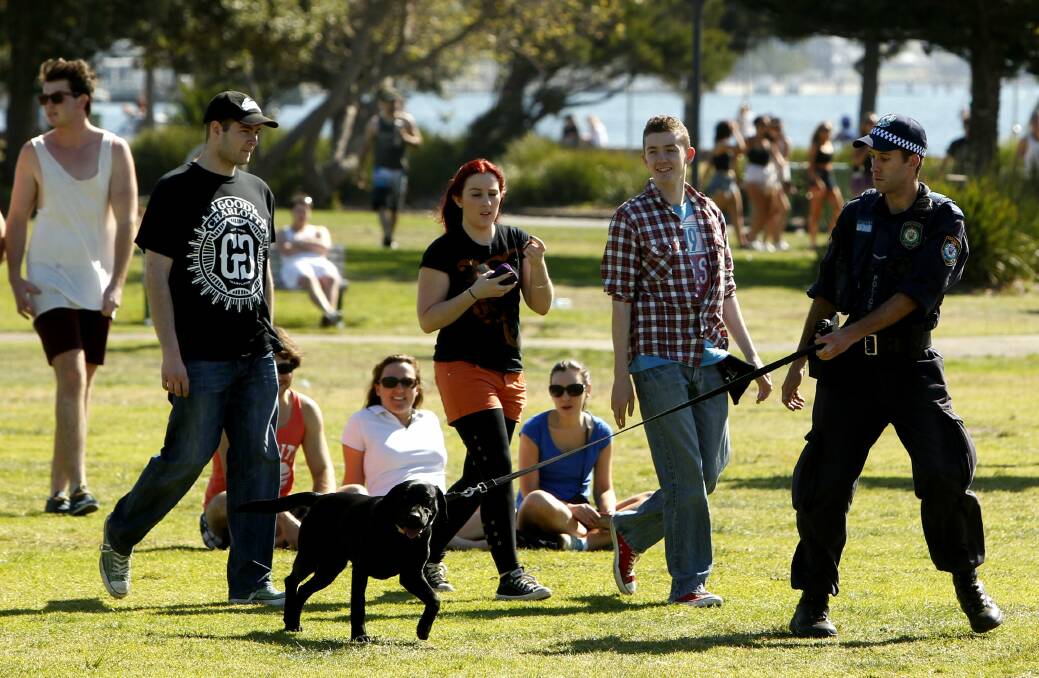
The Greens have attacked the police’s drug dog program as “appallingly wasteful and abusive”, on the back of new figures which indicate more than three quarters of searches in Newcastle turn out to be false positives.
Subscribe now for unlimited access.
or signup to continue reading
Greens MP David Shoebridge said nothing was found in a similar proportion of strip searches, amounting to the “ultimate indignity” for targets.
It came as he prepared to launch the party’s “Sniff Off” campaign at the Hamilton Station Hotel on Friday evening, which uses social media to warn people about the presence of drug detection dogs, particularly on public transport.
“Even when they do identify drugs on people, it’s overwhelmingly tiny amounts, a single joint or pill,” Mr Shoebridge said. “It’s clearly a useless program in terms of the supply of drugs.”
However a spokesperson for Police Minister Troy Grant returned fire.
“The NSW Police Force has the full backing of this government in their use of drug detection dogs as a tool to rid our streets, events and public transport system of drug crime,” she said.
“The Greens may support people taking drugs, but the Liberal/Nationals government are focused on reducing drug crime through a number of measures, including drug detection dogs.”
Data obtained by the Greens showed there were 684 searches as a result of sniffer dogs in the Newcastle Local Area Command between 2014 and 2017.
Read more:
Drugs were found on 150 occasions, while in 78 per cent of cases police came back empty-handed.
Across the Central Hunter, 72 per cent of searches returned false positives, while the figure sat at 71 per cent in Lake Macquarie and 54 per cent in Port Stephens.
Tighes Hill resident Tim Buchanan frequently rides the train between Newcastle and Sydney and has been searched five times.
However on three of those occasions, the sniffer dog was “not particularly interested” until the handler encouraged it to target him by standing near him and making noises, he said.
All of the searches failed to turn up any drugs.
“The most intense time … the dog walked past but the cop came back and literally double-tapped me on the knee. Then the dog sat down and I got searched,” he said.
He said it was “highly embarrassing” to be subject to a full police search on a train full of people.
“I assume I’m being typecast, that seems to be really clear to me,” he said. “I’m a young male, I have long hair, I sort of wear surfie clothes – I’m not a suited gentleman.”
Mr Buchanan argued the dogs were all about the “appearance” of active policing.
“It’s not like the drug king pins of Newcastle are riding around on opal cards,” he said.
Mr Shoebridge questioned whether the state government could back up its claim that the drug dogs were a core part of their harm minimization strategy, saying his demands for a cost-benefit analysis or peer-reviewed studies had fallen on deaf ears.
“You wonder how they can keep making that assertion without a shred of evidence to support it,” he said, adding that the large number of officers deployed with dog handlers meant resources were pulled off “actual policing”.
“Particularly at music festivals, the drug dog program can be a cause of active harm,” he said. “Young, often inexperienced festival-goers will see the drug dogs at the entrance and, in a panic, ingest any drugs they have. Tragically this can lead to over-dosing.”
The Greens have called for amnesty bins to be placed at the festivals so people can dispose of their drugs safely.
But the spokesperson for Mr Grant rubbished suggestions the drug dogs were ineffective.
“Police arrested more than 150 party-goers for drug possession or supply at two music festivals in January this year, with the help of drug detection dogs,” she said.
“It beggars belief the Greens would suggest police turn a blind eye to events known to be drug hot spots.”

